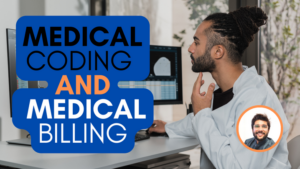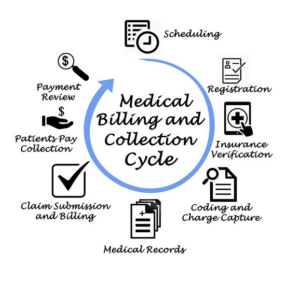Becoming a Medical Biller or Coder
Are you considering a career in medical billing and coding? This profession is in high demand, and you don’t need a medical degree. In this field, you handle payments for doctors, insurance companies, and patients.
With the growth of healthcare services, the demand for medical billers and coders is on the rise. If you’re wondering how to become a medical coder, you’re in the right place!
Medical codes are like specialized terms that explain how much a doctor charges for their services. Coders use these codes to update medical records and claims, describing the treatments patients receive. These codes include ICD-10 coding and CPT codes, which are crucial for accurate billing.

Struggling to meet your deadline?
Get your assignment on Becoming a Medical Biller or Coder done by certified MDs and PhDs in the USA. ORDER NOW!
What is Medical Billing?
Medical billing involves creating and sending bills to patients and insurance companies. Medical billers use specialized software to input medical codes and submit claims to insurance companies or government agencies like Medicare. They also send statements to patients for costs not covered by insurance. A medical biller may also:
- Verify insurance coverage, pre-authorizations, and referrals.
- Rectify billing statements and payments.
- Establish payment plans and manage overdue accounts.
- Contest denied insurance claims.
- Understand HMO/PPO, Medicare, and Medicaid coverage.
The U.S. Bureau of Labor Statistics (BLS) projects a 9% growth in jobs in this field from 2020 to 2030. This is due to the high demand for healthcare services, especially among older adults and expanded insurance coverage. According to the American Association of Professional Coders (AAPC), the average annual medical billing and coding salary for a medical biller and coder is $54,800. Earnings can vary depending on your work setting, level of education, certifications, and experience.
What is Medical Coding?
Medical coders work with medical terminology and assign codes to it. These codes describe treatments, procedures, equipment, and services. Coders input these codes into billing systems, ensuring that healthcare providers receive correct payment, either through insurance or directly from patients.
Medical coders play a vital role in ensuring accurate billing and payment and typically work independently. However, they need to communicate effectively with medical billers, doctors, nurses, and administrative staff. Common medical coding specialties include areas such as anesthesia, orthopedics, and telehealth billing.
The day-to-day tasks of medical coders can vary since they work in various healthcare settings. Nevertheless, common responsibilities include:
- Analyzing patient records and clinical reports.
- Researching reimbursement and payment information.
- Translating medical information into codes for billing.
- Adhering to federal and state regulations for compliance.
- Conducting audits to ensure accuracy.
Similar to medical billers, medical coders can expect increased job opportunities in the coming years. The AAPC reports that certified coders earn an average annual salary of $60,100, while those without certifications make around $47,200. Earnings can also vary based on specialties, education, and experience.
Steps to Becoming a Medical Biller or Coder
- Get a High School Diploma (or Equivalent)You can begin a basic job in medical billing and coding with a high school diploma or a GED certificate. However, to broaden your career options and enhance your earning potential, consider pursuing medical billing certification programs and advanced training. Most certificate and diploma programs, as well as associate degrees, require a high school diploma or equivalent for admission.
- Enroll in Medical Billing and Coding ProgramsDiploma programs and associate degrees are the most common pathways to enter the field of medical billing and coding. You can find these programs at vocational and technical schools. They typically take a year or less to complete, providing the training necessary for national coding certification exams and entry-level positions. Many schools also offer best online medical coding courses. Employers often prefer hiring individuals with associate degrees, which typically require two years. An associate degree provides a strong foundation in general education, focusing on medical terminology, coding, and information technology (IT). Graduates with associate degrees can explore job opportunities in insurance companies, government positions, and healthcare providers. Many students also transfer their associate degree credits to bachelor’s programs.
- Pass Certification ExaminationsHealthcare employers generally prefer to hire billers and coders with professional certifications. These certifications demonstrate mastery of complex billing and coding requirements mandated by the government, opening doors to more job opportunities and higher salaries.
- Find EmploymentMany schools offering medical billing and coding training also provide career services to assist you in preparing your resume, honing your interview skills, and identifying job openings. When applying for jobs, be sure to include any internships and relevant work experience on your applications. You can also consult the AAPC’s resources to discover the cities and states with the best job opportunities and highest salaries.
Medical Billing and Coding Certification
While professional certification is not mandatory to find employment as a medical biller, having one can expand job options and potentially lead to higher salaries. The Certified Professional Biller (CPB) credential from AAPC is one of the most recognized certifications in the billing field, confirming that medical billers have mastered the skills required to manage healthcare providers’ revenue cycles.
The CPB exam comprises 200 multiple-choice questions focused on billing practices, managed care, Medicare and Medicaid, and HIPAA compliance. Another certification to consider is the Certified Billing and Coding Specialist (CBCS), administered by the National Healthcareer Association. This certification focuses on medical billing and coding for insurance claims, with the 100-question exam covering various aspects of the revenue cycle, compliance, insurance eligibility, coding guidelines, and reimbursement.
Medical Billing Program Overview
Medical billing curriculum includes similar courses in medical terminology, medical ethics and law, and anatomy and physiology. Additionally, medical billing coursework covers:
- Healthcare communications.
- Records management.
- Computer applications for billing.
- Health insurance and reimbursement.
Medical Billing Certification
While professional certification is not mandatory to find employment as a medical biller, having one can expand job options and potentially lead to higher salaries. The Certified Professional Biller (CPB) credential from AAPC is one of the most recognized certifications in the billing field, confirming that medical billers have mastered the skills required to manage healthcare providers’ revenue cycles. The CPB exam comprises 200 multiple-choice questions focused on billing practices, managed care, Medicare and Medicaid, and HIPAA compliance. Another certification to consider is the Certified Billing and Coding Specialist (CBCS), administered by the National Healthcareer Association. This certification focuses on medical billing and coding for insurance claims, with the 100-question exam covering various aspects of the revenue cycle, compliance, insurance eligibility, coding guidelines, and reimbursement.
Medical Coding Program Overview
Most coding programs provide training in medical terminology, coding classifications, HIPAA compliance, and Medicare and Medicaid policies. Typical medical coding classes include:
- Diagnostic and procedural coding.
- Billing and coding applications.
- International diseases classification.
- Current terminology coding.
Medical Coding Certification
Both AAPC and the American Health Information Management Association (AHIMA) offer widely recognized certifications for medical coders, including:
- Certified Professional Coder (CPC): AAPC administers the popular CPC credential, indicating mastery of all standard code sets, guidelines, and management principles. The multiple-choice exam covers 17 areas, including the correct procedures for supplying diagnosis codes used by healthcare providers.
- Certified Coding Assistant (CCA): AHIMA’s CCA certification covers six domains, including clinical classification systems, reimbursement methodologies, health records and data content, compliance, IT, and confidentiality and privacy.
- Certified Coding Specialist (CCS): This AHIMA certification signifies expertise in coding skills and documentation, provider queries, and compliance. The CCS exam includes multiple-choice questions and a medical scenario section.
Medical coders can pursue even more specialized certifications from AAPC, including auditing, documentation, risk adjustment, and physician practice management. Experienced coders can obtain certifications in specific medical disciplines such as anesthesiology and pain management, orthopedic surgery, and plastic and reconstructive surgery.
Working in Medical Billing and Coding
According to the BLS, employment for medical records and health information specialists will increase at a slightly faster-than-average rate of 9% from 2020 to 2030. Most jobs in this field are found in the following settings:
Hospitals (State, Local, and Private)
Hospitals are the major employers of medical records and health information specialists, hiring 37% of all workers in this category. Specific duties may vary depending on the size of the hospital, but medical billers and coders play a crucial role in managing revenue cycles. Accurate and up-to-date revenue data enables hospitals to receive insurance reimbursements and patient payments on time.
Physicians’ Offices
Doctors’ offices require reliable medical coding and billing services. Larger clinics may offer higher salaries, while smaller offices might provide a less stressful environment with lighter workloads. Doctors’ offices, especially smaller practices, often hire individuals who perform both billing and coding roles.
Administrative and Support Services
Many healthcare providers, government agencies, and insurance carriers rely on medical billers and coders in administrative and support roles. They design and carry out procedures that can enhance efficiency and profitability.
In large healthcare facilities, IT specialists and consultants are hired to streamline coding and billing work. In smaller settings, administrative assistants with coding and billing expertise handle patient inquiries and process claims.
At insurance agencies, these professionals verify claims and work with patients to collect information and explain benefits.
Professional, Scientific, and Technical Services
This category includes colleges, law offices, insurance agencies, and IT companies. Colleges and technical schools hire experienced medical coders to train the next generation. Law offices hire coding and billing specialists to investigate fraud claims.
As electronic health records become more widespread, IT departments will hire more medical billing and coding experts to create, improve, and modify coding and billing systems.
Government agencies hire medical billers and coders to work on research projects. In these settings, they collect and analyze medical data for population health studies and healthcare policy reform.
Management of Companies and Enterprises
Medical billers and coders can pursue leadership opportunities in roles such as auditors, administrators, operations managers, and trainers. These positions are often available in insurance, private healthcare systems, and accounting and payroll services.
Medical Billing and Coding: Frequently Asked Questions
How long does it take to become a medical billing and coding specialist?
You can embark on an entry-level career in medical billing and coding with just a high school diploma or a GED certificate. However, obtaining certification and advanced training can enhance your job prospects. Diploma programs typically take a year or less to complete, while most associate degrees require two years. Meeting certification requirements may add extra time before you start working.
How can I become a medical coder quickly?
If you aim to become a medical coder in the shortest time possible, consider enrolling in medical billing and coding programs offered by vocational or technical schools. Some of these programs can be completed in six months or less. The time required may vary depending on your chosen specialty and whether you study full-time or part-time.
How much does a medical coder earn per hour?
The average hourly wage for medical coders varies by location. For instance, according to AAPC, Washington, D.C. offers the highest average hourly wage of $34.06, while Mississippi provides the lowest at $22.24.
Is medical coding a stressful job?
The level of stress in medical billing and coding can depend on the work environment. Billers and coders employed in small clinics and medical practices may experience less pressure compared to those working for large healthcare providers and insurance companies. Many billers and coders who work remotely report experiencing less stress and greater job satisfaction.
Conclusion
In conclusion, a career in medical billing and coding offers a rewarding pathway for those interested in the healthcare field without needing a medical degree. With the growing demand for healthcare services, the need for skilled medical billers and coders is increasing, making it an opportune time to enter this profession. By understanding the distinct roles of medical billers and coders, individuals can choose the path that aligns best with their skills and interests.
To become a successful medical biller or coder, obtaining relevant training is essential. Many students benefit from online medical billing and coding programs, which provide flexibility and comprehensive coursework in medical terminology, billing practices, and coding standards. These programs often culminate in certification, such as the Certified Professional Biller (CPB) or Certified Professional Coder (CPC), which can significantly enhance job prospects and earning potential.
As the U.S. Bureau of Labor Statistics projects steady job growth in this field, medical billers and coders can look forward to a variety of employment settings, including hospitals, physician offices, and insurance agencies. The average annual salary for medical billers and coders varies based on experience and certification, with certified professionals generally earning more.
For those considering this career, understanding the necessary steps—such as obtaining a high school diploma, enrolling in medical billing and coding programs, and passing certification exams—is crucial. Resources like online medical research and guidance from professional organizations can provide valuable support throughout the process.
Overall, medical billing and coding represents a vital component of the healthcare system, ensuring accurate payments and efficient operations. With the right training and commitment, aspiring medical billers and coders can build successful careers in this dynamic field.

Dont wait until the last minute.
Provide your requirements and let our native nursing writers deliver your assignments ASAP.


